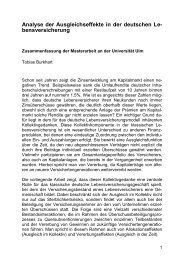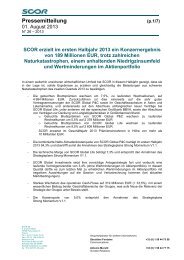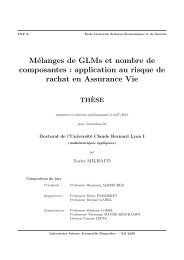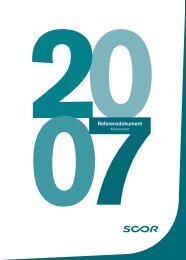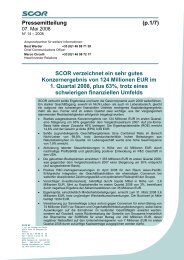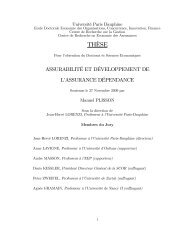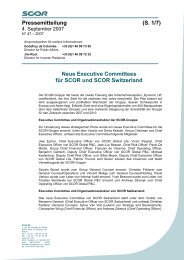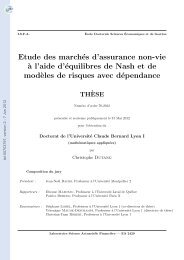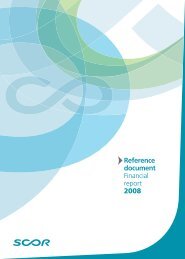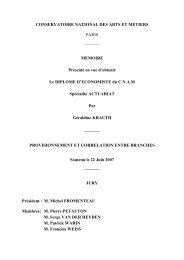4.4 Legal risk - Scor
4.4 Legal risk - Scor
4.4 Legal risk - Scor
Create successful ePaper yourself
Turn your PDF publications into a flip-book with our unique Google optimized e-Paper software.
elies, to a considerable extent, on the quality of local management in the regions and countries in which it operates. The<br />
success of its operations is dependent, among other things, on its ability to attract and retain highly qualified professional<br />
people on a global scale. Competition for such key people in most countries in which it operates is intense. SCOR’s<br />
ability to attract and retain key people, and in particular directors, experienced managers and investment managers,<br />
fund managers, underwriters and actuaries, is dependent on a number of factors, including prevailing market conditions<br />
and compensation packages offered by companies competing for the same talent. If SCOR is unable to attract or retain<br />
key personnel, this could have a material and adverse effect on its financial condition, results of operations and<br />
business.<br />
The Group believes its modeling, underwriting, price calculation and information technology and application systems are<br />
critical to the operation of its businesses. Moreover, its proprietary technology and applications are an important part of<br />
the Group’s underwriting and claims management processes and are a contributing factor to its competitiveness. It is,<br />
therefore, exposed to a major breakdown in its IT systems, outages, disruptions due to viruses, attacks by hackers and<br />
theft of data. SCOR is also exposed to <strong>risk</strong>s relating to the integration of the underlying data of newly acquired<br />
companies into its operating and financial accounting IT systems.<br />
A major defect or failure in SCOR’s internal controls or IT and application systems could result in a loss of efficiency of<br />
its teams, harm to its reputation, increase in the <strong>risk</strong> of external fraud, or increased expense or financial loss.<br />
The Group also uses certain licensed systems and data from third parties. It cannot be certain that its technology or<br />
applications owned or licensed will continue to operate as intended, or that they will continue to be compatible with each<br />
other, or that it will have access in the future to these or comparable licensors or service providers.<br />
Some of SCOR’s processes are partly or completely outsourced. Outsourcing can increase operational <strong>risk</strong> which could<br />
cause a significant impact on its results and/or reputation.<br />
SCOR, as every company, must comply with laws and regulations. Furthermore, as an international Group, it must take<br />
into account international laws and regulations. The level of legal or regulatory requirements depends on the country and<br />
the legal structure of the entity. The <strong>risk</strong> is that it might not respect the level of required compliance appropriate to each<br />
location and legal structure. Its reputation could be affected.<br />
For direct business, SCOR is subject to the laws, regulations and tax rules governing direct insurance which can create<br />
specific compliance <strong>risk</strong>s (i.e. different from those relating to reinsurance business). Any violation of such laws and<br />
regulations could expose SCOR to legal <strong>risk</strong>s or class actions.<br />
In the case of medical underwriting (including SCOR Telemed, a subsidiary of SCOR Global Life), some information<br />
required from the policyholders may be confidential. SCOR Telemed is a dedicated tele-underwriting company. The<br />
company uses IT software to conduct telephone interviews and has a specialized underwriting system to assess<br />
individual <strong>risk</strong>s. There is a <strong>risk</strong> regarding compliance with data privacy laws in force in each country.<br />
An operational <strong>risk</strong> failure, in particular the failure of internal control procedures, could have an adverse impact on the<br />
Group’s business, present and future revenues, net income, cash flows, financial position, and potentially, on the price of<br />
its securities.<br />
See “Appendix B – II. Internal control and <strong>risk</strong> management procedures, C. Principal activities and participants of <strong>risk</strong><br />
control” for further information on <strong>risk</strong> mitigation actions.<br />
4.1.12 SCOR’S RISK MANAGEMENT POLICIES AND PROCEDURES MAY LEAVE IT EXPOSED TO UNIDENTIFIED<br />
OR UNANTICIPATED RISK, WHICH COULD NEGATIVELY AFFECT ITS BUSINESS<br />
Risk management requires, among other things, policies and procedures to record properly and verify a large number of<br />
transactions and events. SCOR’s <strong>risk</strong> management policies and procedures may not be sufficient. Many of its methods<br />
for managing <strong>risk</strong> and exposures are based upon the use of observed historical market behavior or statistics based on<br />
historical models. As a result, these methods may not fully predict future exposures, which can be significantly greater<br />
than the historical measures indicate, particularly in unusual markets and environments. Other <strong>risk</strong> management<br />
methods depend upon the evaluation of information regarding markets, clients, catastrophe occurrence or other matters<br />
that is publicly available or otherwise accessible to SCOR. This information may not always be accurate, complete, upto-date<br />
or properly evaluated. Furthermore, the Group cannot exclude the possibility of exceeding SCOR’s <strong>risk</strong> tolerance<br />
limits due to an incorrect estimation of its <strong>risk</strong>s and exposures. If its policies and procedures prove to be insufficient, the<br />
business, present and future revenues, net income, cash flows, financial position, and potentially, the price of its<br />
securities could be materially and adversely affected.<br />
See “Appendix B – II. Internal control and <strong>risk</strong> management procedures, C. Principal activities and participants of <strong>risk</strong><br />
control” for further information on <strong>risk</strong> mitigation actions.<br />
4.1.13 SCOR IS EXPOSED TO RISKS RELATED TO ITS ACQUISITIONS<br />
In recent years, SCOR has completed a number of acquisitions around the world. The Group may make further<br />
acquisitions in the future. Growth by acquisition involves <strong>risk</strong>s that could adversely affect its operating results, including<br />
the substantial amount of management time that may be diverted from operations to pursue and complete acquisitions.<br />
Acquisitions could also result in the incurrence of additional indebtedness, costs, contingent liabilities, and impairment<br />
29



